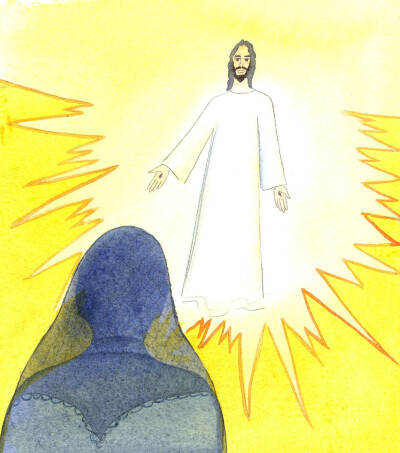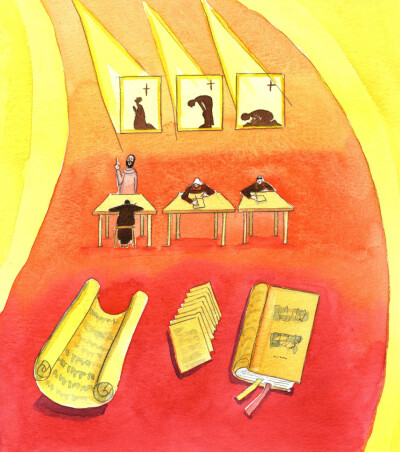Search Page
Showing 1 - 20 of 20
"Would St. Paul Recognise it?" The Lord showed me the 'New Gospel' preached today by those who dissent from the Church's teachings, and who rarely mention sin or punishment, and speak as if it is easy to be saved, no matter how a person chooses to live.
Christ said to me, about the mantilla I was wearing in Church: "This is what I want every woman to do" - as a mark of respect for Him. Or we can wear a headscarf, hat or veil; so long as we cover most of our hair, just as St. Paul recommends, and as has been customary in the Church for two thousand years.
When a new convert acts pleasantly, when he has formerly acted against the Church, it can be difficult for other Catholics not to be suspicious about his sincerity. St. Paul, too, was not immediately accepted. Each Catholic, nevertheless, must treat fellow-Catholics - 'new' or old - as brothers and sisters in the family of God.
The Church teaches the truth, in every age of our history, yet each of the mystics experiences it - for example, St Paul, St Teresa of Avila, St Thomas Aquinas. It is the Christian mystic who prays with trust, reverence and humility, who knows God better than anyone, through union with Christ in prayer. The mystics have produced the most lyrical and intellectually-coherent accounts of what they have learned of God - which knowledge echoes and confirms the truths taught by the Church, and illumines them.
Saint Paul advises Christ's followers to remember that Christ is with His friends all the time; and we should revere the Lord Jesus in our hearts at any time of day as well as being prepared to explain our Faith to enquirers.
Christ is the way, the truth and the life: the only Saviour. Christ asks every Christian teacher, author, parent, religious, Clergyman and missionary to do what St. Paul did, who urged people to be reconciled with God, through Christ, in Baptism or Confession. It is as if Christ says, in this age of hesitation or even doubt: 'Would you send people to a false god or to false prophets?' He is the Way.
Saint Paul warned us that the faithful are 'certain to be attacked'. This harm can be emotional, spiritual or intellectual instead of physical; but we can be wise and prudent as well as patient and uncharitable. It is not wrong to avoid the trouble caused by those who are simply malicious, or unpredictable and unwilling to respond to kindness or to listen to reason.
Saint Paul spoke wisely about bearing our sufferings. We are right to offer up our sufferings in union with Christ, and, with Him, to intercede for people trapped in mortal sin and in danger of being lost for ever. Someone in mortal sin is as if trapped on a small ledge, above the great Abyss; and by our prayers and the grace of Christ he or she can be rescued and made safe.
St. Paul spoke, by the altar of the 'Unknown God'. Like St. Paul, we should admire the efforts of people of other religions to search for God; yet like him, we should seize opportunities of telling people who have never heard the good news, about what God has done for us, in love for us, through Jesus Christ, who came through Mary.
St Paul was full of fervour, and ideas about how to spread the Gospel; yet Christ guided Saint Paul in specific ways, showing him what places to go to and which to avoid, with marvellous results. Yet Christ cannot guide Catholics today, to do great works, if they are not willing to obey Him in everyday matters, including morals, and if they ignore or argue about the Church's teachings.
Holiness, by Elizabeth Wang
This text is the complete version of the pamphlet entitled 'SPEAK ABOUT HOLINESS'. It is based on a talk given by Elizabeth Wang.
Preface.
This little book contains the full version of the text I …
What is Mary Like? by Elizabeth Wang
This text is the complete version of the pamphlet WHAT IS MARY LIKE?
“Now having met together; they asked him, ‘Lord, has the time come? Are you going to restore the kingdom to Israel?’ He replied,…
The Purpose of the Priesthood, by Elizabeth Wang
‘The Purpose of the Priesthood contains encouragement and advice for Catholic priests. It reminds them about the central meaning of the Priesthood, and about the need to teach the Catholic Faith in it…
Autobiography of Elizabeth Wang, Part 1
This text forms part of Elizabeth Wang's Falling in Love: A Spiritual Autobiography (1999). It tells the story of her life and of her spiritual journey as she came to know Christ and His Church.
You …
Autobiography of Elizabeth Wang, Part 2
This text forms part of Elizabeth Wang's Falling in Love: A Spiritual Autobiography (1999). It tells the story of her life and of her spiritual journey as she came to know Christ and His Church.
You …
Autobiography of Elizabeth Wang, Part 3
This text forms part of Elizabeth Wang's Falling in Love: A Spiritual Autobiography (1999). It tells the story of her life and of her spiritual journey as she came to know Christ and His Church.
You …
Autobiography of Elizabeth Wang, Appendix on Prayer
This text forms part of Elizabeth Wang's Falling in Love: A Spiritual Autobiography (1999). It tells the story of her life and of her spiritual journey as she came to know Christ and His Church.
You …
A Picture of a Faithful Diocese
A short piece of writing by Elizabeth Wang about how the Catholic faith can be lived and celebrated within a Faithful Diocese, and the responsibilities of all the faithful - and especially bishops - t…
Union with God and the Mass, by Elizabeth Wang
This text forms Part 1 of the book THE MASS THROUGH THE EYES OF CHRIST.
The Holy Trinity The soul, a 'Kingdom'. Each baptised person who is in a state of grace can say, of his own soul: "My soul is …
Communion with the Trinity, by Elizabeth Wang
This text is based on a talk with the title 'The Holy Trinity: Reaching Out to Help Us'.
Let's start with a passage from the letter to the Hebrews, Chapter 12, verse 1:
“With so many witnesses in …
Showing 1 - 20 of 20










